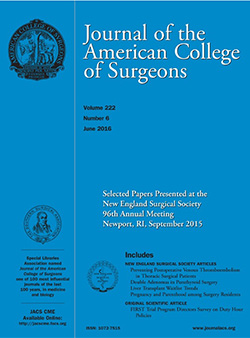 A journal has retracted a 2016 study on the use of radiation by breast cancer patients after the authors misinterpreted what was reported in a national cancer database.
A journal has retracted a 2016 study on the use of radiation by breast cancer patients after the authors misinterpreted what was reported in a national cancer database.
Correcting for the error, according to the retraction notice, had a “dramatic impact on the original article data and conclusions.”
Quyen Chu, a surgeon at Louisiana State University Health Shreveport, told us that the problem appears to stem from a misunderstanding about the US National Cancer Database (NCDB). After the paper was published, the NCDB pointed out to Chu that a key data point had not been reliably or consistently collected during the timeframe relevant to the study. The database’s user’s manual says essentially the same thing; Chu said he and his authors read it, but misunderstood it.
The original Journal of the American College of Surgeons study looked at whether a 2004 National Comprehensive Cancer Network treatment guideline — which suggested some patients could avoid radiation on top of surgery and hormone therapy — led to an actual decrease in radiation therapy. But the error forced the authors to drop tens of thousands of patients treated before 2004, which had a severe impact on their ability to draw conclusions.
Chu told us:
With any large database, you’re going to have limitations. We as researchers have to understand these limitations.
“Impact of Cooperative Trial and Sociodemographic Variation on Adjuvant Radiation Therapy Usage in Elderly Women (≥70 Years) with Stage I, Estrogen Receptor-Positive Breast Cancer: Analysis of the National Cancer Data Base” suggested the impact of the guidelines had been minimal — specifically, after 2004, the rate of patients receiving radiation dropped by just 3 percent.
After publication, the NCDB inquired how the authors arrived at the large size of the 1998-2004 patient group; the database had not consistently tracked estrogen and progesterone receptor expression data — a key to determining treatment options — prior to 2004. As a result, more than 90,000 patients included in the 1998 to 2004 group had to be dropped. Chu said that all those dropped patients matched their post-2004 counterparts on every other criteria, except for the hormone receptor data field.
Initially published in January 2016, the paper was retracted in March. It has been cited four times, according to Clarivate Analytics’ Web of Science, formerly part of Thomson Reuters.
Per the notice:
This article has been retracted at the request of the Editor-in-Chief of the Journal of the American College of Surgeons, as the original data was found to be inaccurate after updated data was provided by the authors, and this had a dramatic impact on the original article data and conclusions.
JACS editor Matt Carmichael said the authors learned of the data inconsistencies on March 24, 2016, two months after publication and notified the journal soon after, eventually providing an updated data table on July 19, 2016.
Unfortunately, the updated data was received too late to simply update the manuscript.
He added that the authors agreed a retraction was “necessary and appropriate.” As for why it took until March of this year to issue the retraction, Carmichael wrote:
We notified our publisher, Elsevier, of the retraction in July [2016]. The retraction was then scheduled for processing and review by their committee, and the final retraction was delivered in March, so Elsevier’s retraction process took approximately [eight] months in this case.
Chu said his team reanalyzed the data and reached a similar general conclusion, that the guidelines had not led to a significant decrease in radiation therapy in those women. He said that JACS invited them to submit their updated paper, but the journal has rejected the resubmission. The team intends to submit the study to another journal.
Like Retraction Watch? Consider making a tax-deductible contribution to support our growth. You can also follow us on Twitter, like us on Facebook, add us to your RSS reader, sign up on our homepage for an email every time there’s a new post, or subscribe to our daily digest. Click here to review our Comments Policy. For a sneak peek at what we’re working on, click here.
This is a problem often overlooked in all the discussions of data sharing. Even the originators of the data can get confused over exactly what the right data are or what a given variable really is. Data users who are just downloading the data from somewhere else are yet more likely to have misunderstandings that no reviewer or editor will realize have even occurred.